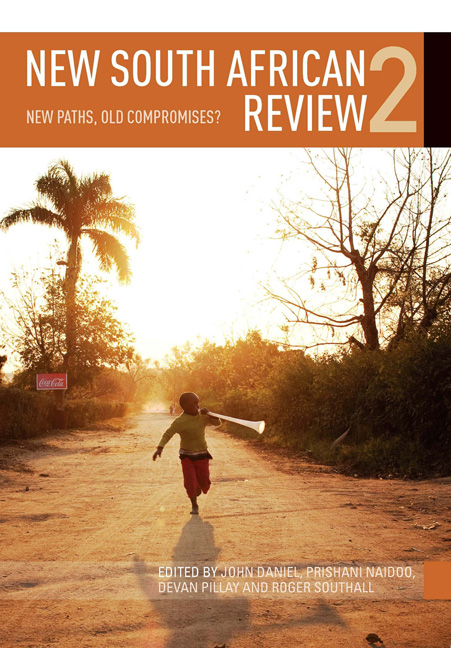Book contents
- Frontmatter
- Contents
- Preface
- Introduction: New paths, old (com)promises?
- PART 1 POLITICS AND INTERNATIONAL
- PART 2 ECONOMY AND SOCIETY
- Introduction: Continuing crises, contradictions and contestation
- Chapter 8 ‘The wages are low but they are better than nothing’: The dilemma of decent work and job creation in South Africa
- Chapter 9 The crisis of childcare in South African public hospitals
- Chapter 10 The worker cooperative alternative in South Africa
- Chapter 11 Policing in the streets of South African townships
- Chapter 12 BEE Reform: The case for an institutional perspective
- Chapter 13 Bokfontein amazes the nations: Community Work Programme (CWP) heals a traumatised community
- PART 3 ENVIRONMENT
- PART 4 MEDIA
- Contributors
- Index
Chapter 9 - The crisis of childcare in South African public hospitals
from PART 2 - ECONOMY AND SOCIETY
Published online by Cambridge University Press: 23 March 2018
- Frontmatter
- Contents
- Preface
- Introduction: New paths, old (com)promises?
- PART 1 POLITICS AND INTERNATIONAL
- PART 2 ECONOMY AND SOCIETY
- Introduction: Continuing crises, contradictions and contestation
- Chapter 8 ‘The wages are low but they are better than nothing’: The dilemma of decent work and job creation in South Africa
- Chapter 9 The crisis of childcare in South African public hospitals
- Chapter 10 The worker cooperative alternative in South Africa
- Chapter 11 Policing in the streets of South African townships
- Chapter 12 BEE Reform: The case for an institutional perspective
- Chapter 13 Bokfontein amazes the nations: Community Work Programme (CWP) heals a traumatised community
- PART 3 ENVIRONMENT
- PART 4 MEDIA
- Contributors
- Index
Summary
The words ‘crisis’ and ‘healthcare’ follow each other in sentences so often in South Africa that most citizens have grown numb to the association. Clinicians, health managers and public health experts have been talking about a crisis in access to healthcare for more than half a century, and the advent of democracy has not alleviated the situation.
The subject of this chapter is childcare in public hospitals, where there is undoubtedly a crisis. However, in truth, there are multiple simultaneous healthcare crises – rampant diseases such as HIV/AIDS and tuberculosis; excessively high maternal and child mortality; poorly motivated health professionals; the shut-down of critical units in hospitals; and perennial shortages of vitally needed supplies and equipment. The illhealth of, and dismal health services offered to, children at public hospitals is but the most prominent and painful tip of a predicament that extends beyond child health to adult and geriatric medicine and pervades all levels of the health system, including primary healthcare. Patients – young and old – are dying unnecessarily because South African public hospitals are over-burdened, under-staffed, poorly managed and failing to deliver.
Decades of discriminatory apartheid policies resulted in marked racial disparity in children's health. In 1994, the new democratic government inherited a highly fragmented health service consisting of fourteen health departments (each of the ten Bantustans had its own health department) plus a private sector mainly serving a white minority and funded predominantly through medical insurance. Seventeen years of democracy have yielded varied success for child health and well-being, and the public health system, overburdened from its inception, has yet to catch up with the health needs of the country's children. Excellent child health policies now exist, but there has been less success in transforming them into measurable actions and outcomes. Nine provincial health departments, organised under a single national health department, continue to provide disparate services, with poorer, more rural provinces offering the least care to its children despite significant improvements in their budgetary allocations. Simultaneously, the devastating effects of the AIDS pandemic have rapidly eroded hard-earned child mortality gains.
- Type
- Chapter
- Information
- New South African Review 2New paths, old compromises?, pp. 182 - 201Publisher: Wits University PressPrint publication year: 2012



